US House Committee Pursues Subpoena For Robert Malley
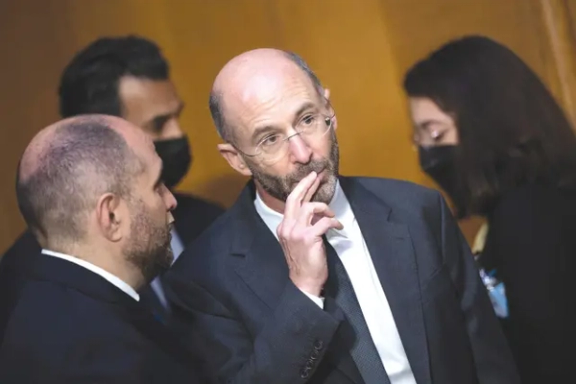
The US House Oversight Committee plans to subpoena Robert Malley, the suspended special envoy to Iran, as part of its investigation into US policies towards Iran.

The US House Oversight Committee plans to subpoena Robert Malley, the suspended special envoy to Iran, as part of its investigation into US policies towards Iran.
According to senior committee aides speaking to Semafor website, the committee alleges that the government has obstructed Congress's repeated attempts to uncover the reasons behind the revocation of Malley's security clearance by US Diplomatic Security in April, which occurred two months prior to him being placed on unpaid leave.
Subsequently, US officials have informed Semafor that the FBI is conducting an investigation into Malley for the suspected mishandling of classified information.
The question is now to understand the truth surrounding Malley’s departure and his role in shaping overall Iran policy in addition to his involvement in negotiating the release of frozen Iranian oil revenues.
The committee is also seeking information about Ariane Tabatabai's security clearance and her involvement in the Iran Experts Initiative, a program that aimed to promote Iran's views on the nuclear negotiations. She serves as the Chief of Staff for the Assistant Secretary of Defense for Special Operations and Low Intensity Conflict (SOLIC).
Congress seeks to understand how these individuals influenced US policies towards Iran, and their support for engaging the Iranian regime. Malley and Tabatabai have defended their involvement in the Iran Experts Initiative, while the International Crisis Group, Malley's former employer, disputes allegations that it was controlled by Tehran.
Concerns about the Biden administration's Iran policy have escalated following Hamas' attack on Israel and speculation about Iran's role in the war.
While Iranian officials have welcomed Hamas' Operation Al Aqsa Flood, which has seen the death of at least 1,500, thousands more injured and 199 people from dozens of nationalities taken hostage, Iran has denied direct involvement. However, as part of its proxy network, it funds Hamas around $100m a year and offers military and logistical support.
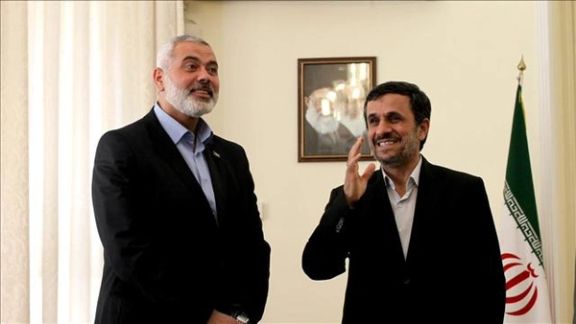
Some officials, including former President Mahmoud Ahmadinejad, are seemingly pressured in Iran to echo Ali Khamenei's support and praise for Hamas' attack on Israel.
Faraz Daily, an online newspaper reminded readers that Ahmadinejad used to deny the Holocaust and asked why he has been "silent in the face of Israel's crimes in Gaza" more than one week after Hamas's bloody attack.
The former president was in Guatemala during the past week to take part in a conference about water resources. However, he came back to Tehran on Saturday evening. Faraz Daily asked whether Ahmadinejad is afraid of taking an anti-Israeli stance under current circumstances, or he does not want to harm his popularity ahead of the upcoming parliamentary elections.
The reason for Ahmadinejad and others, including former hardline nuclear negotiator Saeed Jalili and their like-minded ultraconservatives in the Paydari Party, who have been criticized by the publication, is that these political figures may only echo Khamenei's praise and support for Hamas's atrocity and come under pressure from the Iranian public opinion that overwhelmingly supports Israel as it is evident from their social media posts, or risk being demonized and even prosecuted by Khamenei's hardline supporters.
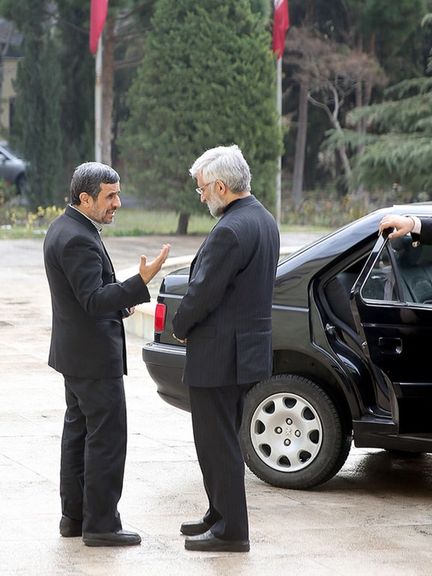
The reason Ahmadinejad, along with others like former hardline nuclear negotiator Saeed Jalili and their fellow ultraconservatives in the Paydari Party, have avoided to speak out is because if they do, they would be compelled to echo Khamenei's praise and support for Hamas's actions. However, the Iranian public opinion largely supports Israel, and they are caught between a rock and a hard place.
During the past week, former Reformist President Mohammad Khatami and former Foreign Minister Javad Zarif in social media posts and press interviews supported Khamenei's positions and immediately came under fire by the public for sympathizing with Hamas.
However, Faraz daily noted that although the state television in Iran, which is the closest media outlet to Khamenei, reflected Khatami and Zarif's opinions about Hamas, it continued its usual criticism of both Reformist figures. Khamenei’s hardliner loyalists do not miss an opportunity to attack anyone who might be slightly independent of the ruler’s rhetoric and confrontational policies.
The media coverage of Ahmadinejad and Jalili's silence may be an attempt by Iran's hardliners to pressure them and their like-minded politicians into expressing support for Khamenei. Since the 2022 protests, political backing for Khamenei has mainly come from staunch hardliners who support him, expecting his favor in return.
Former Parliament Speaker Ali Larijani also attempted to remain non-committal. He posted a typically equivocal tweet that was apparently about the war in Israel but didn't explicitly express support for Khamenei pro-Hamas rhetoric. Later, he deleted the tweet and shared an audio message on X, which was equally vague and did not provide the clear support for Khamenei that hardliners desired.
Centrist daily Sazandegi on Saturday criticized Ahmadinejad and Jalili as well Iranian Nobel laureates Shirin Ebadi (2003) and Narges Mohammadi (2023) for their silence about Gaza. However, the daily did not say why the members of Executives of Sazandegi Party, to which the newspaper belongs, have not been openly taking a stance on the Gaza war and why those mentioned in the article need to rush to express their opinion.
The purpose of the newspaper for attacking these individuals was possibly to show its loyalty to Khamenei in a bid to secure his approval for the candidacy of its affiliated party members in the upcoming March parliamentary elections.
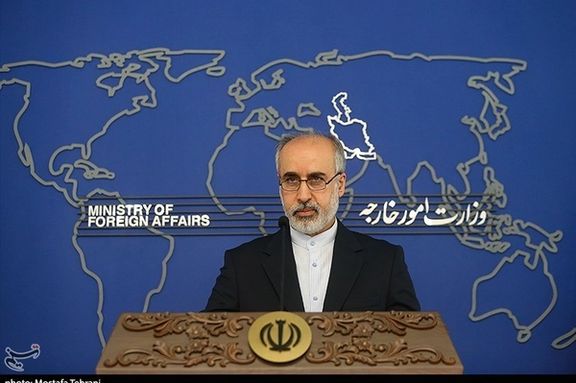
As Israel confirmed that 199 hostages are held in Gaza, Iran's Foreign Ministry claims that its proxy Hamas has expressed readiness to release civilian detainees.
In a Monday press conference, spokesperson for the Ministry of Foreign Affairs Naser Kanaani said, "The Palestinian resistance movement has informed us they are prepared to take necessary actions for the liberation of prisoners and non-military detainees they hold." Kanaani also emphasized the need for “specific prerequisites” to be met for this to become a reality.
There has been no announcement on this through official Hamas channels as yet, while countries including Qatar, Egypt and the US work to release the hostages, dozens of whom are from countries from Europe to north and south America.
While Israel prepares for a ground operation in Gaza, Kanaani used the press conference as a chance to legitimize the escalation of the conflict which began on October 7, when Hamas invaded Israel by land, sea and air, and massacred at least 1,400 people, including roughly 300 soldiers, with numbers rising.
Holding up posters related to the recent bombings in Gaza, Kanaani threatened that the continued path of conflict could "escalate the situation out of control, leading to a range of possibilities," insinuating its biggest proxy, Hezbollah, will get involved from Israel's northern front.
When questioned about whether Iran might directly intervene in the conflict, Kanaani did not provide a clear response. Instead, he referred to the capabilities of Hamas in self-defense and stated, "Hamas is capable in this domain, which is why the Zionist regime has avoided direct confrontation with resistance groups and has drawn the conflicts into non-military areas."
Hamas receives around $100m from Iran each year in addition to military support and training.
Top echelons of the regime continue to push for action against Israel. Ali Akbar Velayati, an advisor to Supreme Leader Ali Khamenei on international affairs, met with a representative of Hamas in Tehran on Monday. He stated, "You should move forward with all your might."
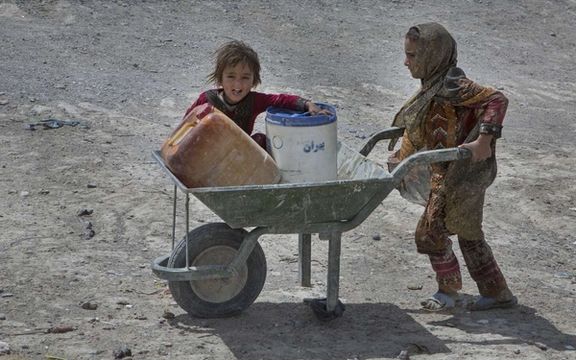
An Iranian citizen from the Sistan and Baluchestan province, one of the country's most economically challenged regions, has taken to social media to slam President Joe Biden’s deal with Iran.
In the video message, he criticizes the release of millions of dollars to the regime and points to dire living conditions within the country. All this, while tens of billions of dollars annually are invested in the country's proxies around the region.
The Iranian, who keeps his identity hidden, showcases his daily meal, a simple mixture of tomatoes and cucumbers, to underscore the stark realities of poverty in his homeland. He highlights the pervasiveness of poverty and corruption in Iran, drawing parallels between the situation in his region and the struggles faced by the people of Gaza.
"Mr. Biden, you released the money, but the money does not reach the poor people, and it goes to a place where every minute someone is killed, and a child is orphaned," he remarks, referencing the ongoing conflict between Iran-backed Hamas, and Israel.
He goes on to implore President Biden to extend assistance to the impoverished residents of Baluchestan, who, according to him, must undertake arduous journeys covering hundreds of kilometers to access even basic healthcare, incurring significant expenses in the process.
The release of $6 billion in Iranian oil revenues by the Biden administration last month as part of a deal to secure the freedom of five American hostages has been met with increasing controversy. The deal faced early objections in Washington, but the situation took a different turn following the Hamas-Israel conflict, resulting in the loss of hundreds of lives.
In the aftermath of the attack, Republican lawmakers intensified their efforts to hold the administration accountable for the move urging Biden to refreeze the money.
Currently the official annual inflation rate is around 50 percent, the highest for more than 30 years with basics such as rent and food, now unaffordable to millions of Iranians thrust below the poverty line.
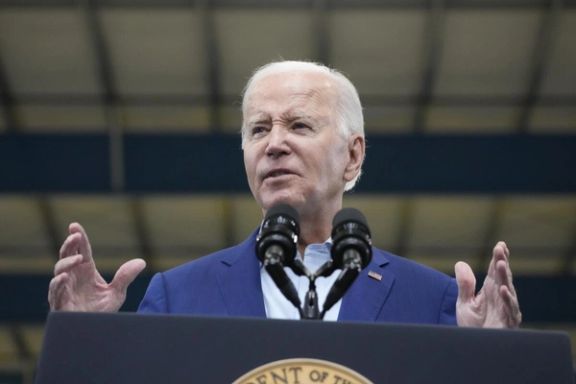
While the US continues to avoid blaming Iran for the Hamas invasion of Israel, President Joe Biden acknowledged the regime’s support for its proxy on Sunday.
And as tensions rise on Israel’s northern border with Lebanon, Iran-backed Hezbollah was more active on Sunday than on any day since the war broke out on October 7, Biden told 60 Minutes: “Hezbollah is a powerful Islamist militia to Israel's north which is armed and trained by Iran. Iran also supports Hamas.”
The unequivocal link to Iran of the recent invasion and atrocities which have left at least 1,400, mostly civilians, butchered after a shock invasion of Hamas special forces, reinforces the fears of the regime’s continued destabilization of the situation.
After multiple attacks from Hezbollah on Sunday, Israel's Ministry of Defense and Israeli Defence Forces announced that residents who live within two kilometers of the border with Lebanon are now being evacuated and offered state-funded accommodation. The move will effect 28 Israeli towns and villages.
Asked for his message to Iran amidst the rising concerns about Tehran possibly getting involved in the war, Biden said simply, “Don't. Don't, don't, don’t,” in a message of deterrence. He reiterated the previous statements from the government that there is “no clear evidence” of Iran’s direct involvement in the Hamas operation, which broke out on October 7, the deadliest single day for Jews since the Holocaust.
Speaking on the hour-long documentary, he said: “Now, Iran constantly supports Hamas and Hezbollah …. [but] did they have foreknowledge, did they help plan the attack, there’s no evidence of that at this point.”
However, the fears of escalation have already seen the US send a powerful naval battle group into the Mediterranean and a pledge to do whatever it takes to support Israel in its battle against Hamas.
Monday morning saw the possible reopening of the Rafah Crossing from Gaza to Egypt to allow the passage of aid and the exit of foreign passport holders, though Israel’s Prime Minister’s office asserted in a press statement there was “no ceasefire”.
On his regional tour, US Secretary of State Antony Blinken and other international diplomats have been working to secure the opening in a bid to retain calm.
Overnight, six top leaders of Hamas’ military and political arms were assassinated, including those directly responsible for the implementation of Operation Al Aqsa Flood, the name given to the invasion on October 7, later declared a war by the terror group, Hamas.
Authorities in Gaza said at least 2,750 people had so far been killed by the Israeli strikes, a quarter of them children, and nearly 10,000 wounded. Another 1,000 people were missing and believed to be under rubble.
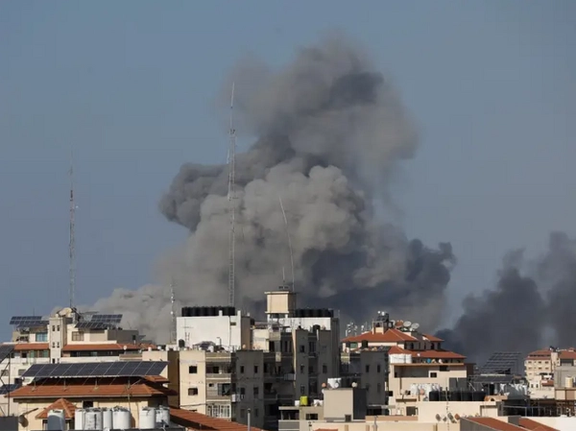
The US has told its citizens in Gaza to get close to the crossing so they can move out, estimating the number of dual-citizen Palestinian-Americans in Gaza at 500 to 600 among the enclave's population of 2.3 million.
Several world leaders are intervening to bring calm, and eyes continue to look to Iran as the backer of its proxies surrounding Israel, including in Syria and the West Bank. French President Emmanuel Macron warned President Ebrahim Raisi against any escalation of the conflict in phone call on Sunday.
”The president of the republic warned President Raisi against any escalation or extension of the conflict, especially to Lebanon," Macron's office said in a statement. "Given its relations with Hezbollah and Hamas, Iran has a responsibility in this respect. Iran must do everything possible to avoid a regional flare-up," it added.
In the US, Senators are also calling for action to weaken the chances of escalation. Senato Lindsey Graham (R-S.C.) warned Iran that should there be escalation on Israel’s northern border, the regime would face consequences.
Speaking in an interview on NBC’s Meet The Press, he vowed to introduce a resolution in the Senate to allow “military action by the United States in conjunction with Israel to knock Iran out of the oil business,” he said.
In a harsh warning, he said: “Iran, if you escalate this war, we’re coming for you.” While official lines from the US government have avoided blaming Iran for the war, he said it was “laughable” to say the regime was not responsible for the October 7 invasion given the historic backing given to the proxy group.
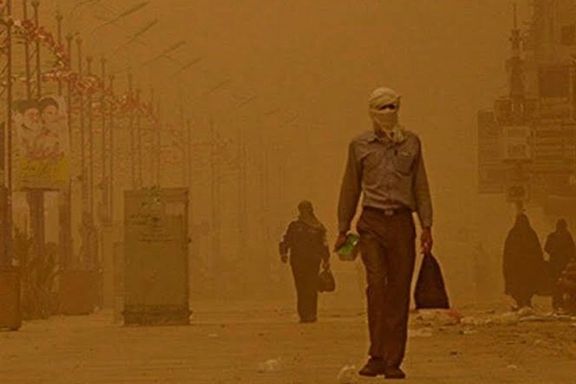
The northern regions of Sistan and Baluchestan Province in Iran have experienced a severe sandstorm resulting in hundreds of citizens being hospitalized.
Over the weekend, at least 511 individuals sought medical attention for respiratory, cardiac, and eye-related complications, according to Majid Mahboubi, the Director-General of the Crisis Management Office of Sistan and Baluchestan Province.
The sandstorm and the dispersion of dust particles have affected five major cities in the province, namely Zahedan, Zabol, Iranshahr, Chabahar, and Nikshahr. Of the 511 victims hospitalized, 484 have been discharged after receiving medical treatment. However, at least 27 people remain hospitalized.
While the government has not released transparent statistics, in the 35 days between August 21 to September 24 alone, fragmented data from the Crisis Management Office suggests that over 3,800 people were hospitalized due to sandstorms.
For over two decades, the 120-day winds of Sistan and Baluchestan have exacerbated the dust phenomena, especially after the drying of the Hamoun wetlands and the formation of new dust centers.
Several factors have contributed to the crisis, including the failure of the government to receive a water share of the Hirmand border river from Afghanistan and the intensification of sandstorms and influx of dust particles. The factors have also led to a water shortage crisis in the region.